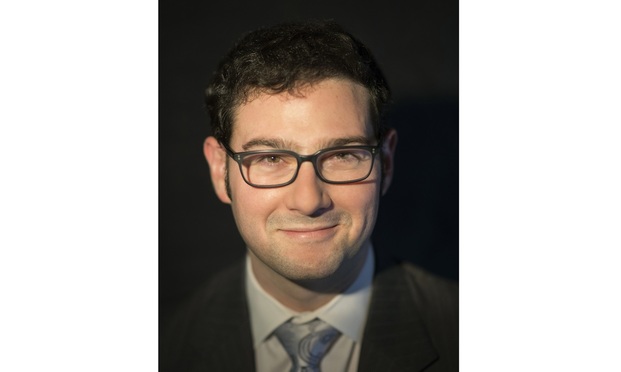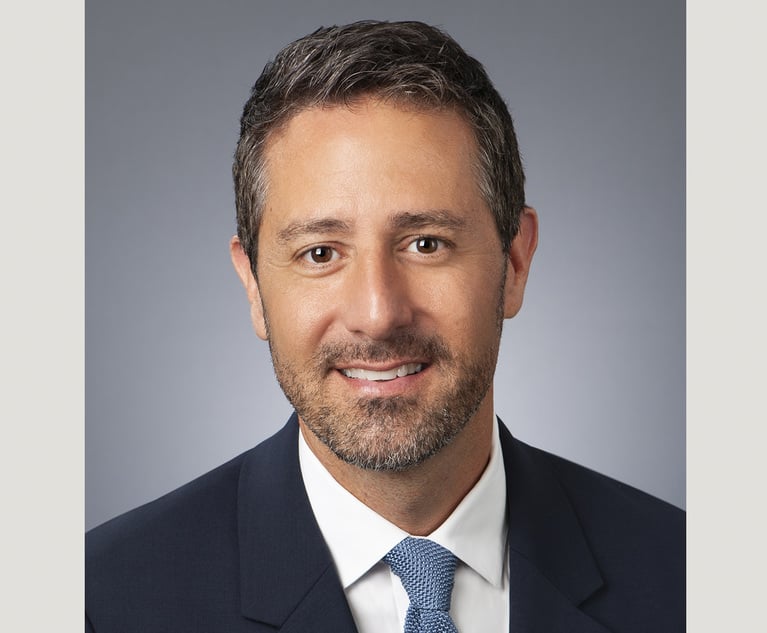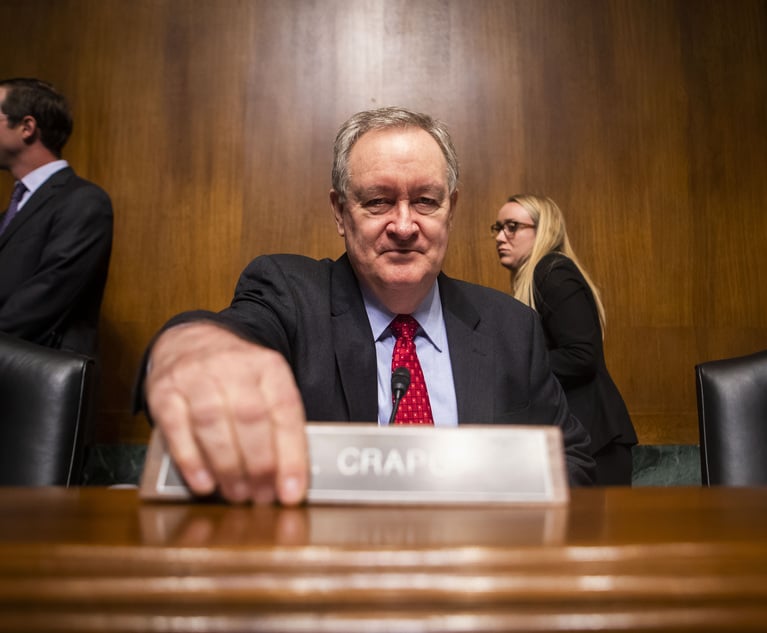California Appellate Law Group Brings Work-Life Balance to a Niche Practice
Chairman Ben Feuer says his firm's model is especially appealing to millennials like him, or lawyers of any generation who want to practice appellate law without the Big Law atmosphere and pressures.
February 12, 2020 at 01:55 PM
9 minute read
The original version of this story was published on Law.com
 Ben Feuer, California Appellate Law Group
Ben Feuer, California Appellate Law GroupThe following is a selection from The Mid-Market Report's Q&A series to help readers get to know midsize law firms around the country, and how they are innovating in an ever-changing legal landscape. More information about subscribing to the Mid-Market Report is available here.
Firm Name: California Appellate Law Group LLP
Firm Leader: Ben Feuer, Chairman
Head Count: 16 (70% female)
Locations: San Francisco (headquarters), Los Angeles, San Diego
Practice Areas: Appellate
Governance structure and compensation model: Our firm is structured on a unique model specifically tailored for high-level appellate practice. The firm takes on no associates; virtually all our attorneys are formally "counsel" with years or decades of appellate experience. Compensation for our attorneys is derived from a balanced and transparent formula, vetted over time, that divides every hour worked into generous portions for the attorneys who worked and generated the hour, with the remainder going to the firm for overhead. The result allows us to offer our lawyers both flexibility with their lives and pay that, hour-by-hour, is often more lucrative than all but the largest of firms.
Do you offer alternative fee arrangements? Of course.
**The following answers were provided by Feuer and edited lightly for style.**
What do you view as the two biggest opportunities for your firm, and what are the two biggest threats?
Opportunity one: Educating in-house counsel and sophisticated trial lawyers about our practice and the benefit from involving a high-end boutique of outside appellate experts throughout the course of litigation. We are very good at what we do—California, 9th Circuit, and Supreme Court appeals, writs, and amicus briefs are the firm's entire focus—and we have found that once sophisticated clients work with us, they come back over and over, often to bring us on board earlier and earlier in the process. That's not least because our fees are boutique-sized, but our impact can play a game-changing role.
Opportunity two: Finding talented appellate lawyers who don't yet know that we've developed a better way to practice high-end appellate law. We give our lawyers their lives back while still demanding excellence; our attorneys work on challenging cases for interesting clients and can earn top-notch compensation, but still have the freedom to watch their kids when they want or spend the springtime in Italy. We do this by reallocating risk and reward, eliminating unnecessary costs, and helping our lawyers to develop their own entrepreneurialism.
The challenges we face are the mirror images of our opportunities: to educate clients and trial lawyers about our firm and what we're doing, and to help potential recruits understand the advantages a non-traditional practice like ours.
The legal market is so competitive now—what trends do you see, and has anything, including alternative service providers, altered your approach? Is your chief competition other mid-market firms, or is your firm competing against big firms for the same work?
While some aspects of legal practice have changed over time, the need for businesses and individuals with serious litigation to retain the smartest and most creative lawyers has not. Nor has the reality that a well-briefed appeal or writ in the right case can undo everything and turn half a decade or more of litigation 180 degrees the other way.
To the extent legal practice has changed because clients aren't simply staying with the same inefficient law firms they've been using for decades, but are rather actively evaluating firms when selecting outside counsel, that trend primarily benefits a newer firm like ours. Clients willing to take a look at us tend to like what they see.
In terms of changes in attracting talent, we're one of the disruptors. We're founded in San Francisco, a city that embraces disruption and change. We knew too many skilled appellate lawyers who liked lawyering itself, but felt they had lost all control over their lives, even though appellate work is well-suited for balance. So we set up a firm that would let our lawyers decide how much they want to work (and earn), and how much they want to spend their time on other pursuits. As a result, we've attracted outstanding talent among lawyers at all different stages of their careers—we have women and men who want to spend more time with their young families; full-time practitioners looking for a firm that values and supports appellate specialists without detrimental rigidity or internal politics; former term federal appellate clerks and retired career state court appellate clerks who want to maintain a chambers-like environment in a private practice; and appellate lawyers from larger firms with substantial books of business who want top-quality attorneys to work on their clients' cases.
Our flexibility and supportiveness have also allowed us to find and retain many terrific female lawyers—in fact, our firm is about 70% female. We're especially pleased with that figure because it's not something we intentionally set out to do, but rather a result of our positive culture and flexible approach.
We don't think of ourselves as a mid-market firm. We think of ourselves as a high-end boutique that offers top-of-class creativity and skill. Our lawyers were U.S. Supreme Court clerks, 9th Circuit clerks, California Supreme Court chambers attorneys, and California Court of Appeal research attorneys; many spent time in top Big Law firms or are appellate specialists certified by the California State Bar. So our competition is both everyone—big firms, little firms, other appellate boutiques, and solo practitioners—and also no one, because we don't do trial work and few if any other appellate-focused practices can match our lawyers' unique experience.
There is much debate around how law firms can foster the next generation of legal talent. What advantages and disadvantages do midsize firms have in attracting and retaining young lawyers, particularly millennials?
Our firm doesn't hire associates, so we don't quite run into that issue in the same way more traditional firms seem to. But millennials aren't a problem—I'm a millennial myself. We also have outstanding appellate attorneys from Generation X and the Baby Boomers. Yes, there are some cultural differences between millennials and what earlier generations experienced. In particular, I think millennials want to be judged on the quality of their work rather than intangibles like whether they play firm politics well, work better in early mornings or late at night, or are seen sitting in their office all day. But I also think other generations want that too, once they learn it's an option. If you're good at what you do, no one wants to be micromanaged. Some firms have more traditional cultures and it works for them and that's fine, but more flexible firms like ours can help bring the benefits millennials helped pioneer to everyone.
Does your firm employ any nonlawyer professionals in high-level positions (e.g. COO, business development officer, chief strategy officer, etc.)? If so, why is it advantageous to have a nonlawyer in that role? If not, have you considered hiring any?
We have not found that to be necessary.
What would you say is the most innovative thing your firm has done recently, whether it be technology advancements, internal operations, how you work with clients, etc.?
Our entire firm structure is innovative, and we try to bring innovations constantly to our practice. We are always open to new ideas about how to do things better, and we are always working to improve what we are doing. We want to remain nimble and flexible so we can respond to what our clients and our attorneys need.
Does your firm have a succession plan in place? If so, what challenges do you face in trying to execute that plan? If you don't currently have a plan, is it an issue your firm is thinking about?
I'm 39 and just bought a home in San Francisco, so I'm not going anywhere. Fortunately, I love what I do, both in terms of appellate practice and in running and growing our business. If something unexpected happened, I have a brilliant partner who would be able to step in and make sure the firm doesn't miss a beat.
This content has been archived. It is available through our partners, LexisNexis® and Bloomberg Law.
To view this content, please continue to their sites.
Not a Lexis Subscriber?
Subscribe Now
Not a Bloomberg Law Subscriber?
Subscribe Now
NOT FOR REPRINT
© 2025 ALM Global, LLC, All Rights Reserved. Request academic re-use from www.copyright.com. All other uses, submit a request to [email protected]. For more information visit Asset & Logo Licensing.
You Might Like
View All
Holland & Knight Hires Former Davis Wright Tremaine Managing Partner in Seattle
3 minute read
Paul Hastings Hires Music Industry Practice Chair From Willkie in Los Angeles

Goodwin Procter Relocates to Renewable-Powered Office in San Francisco’s Financial District

Senator Plans to Reintroduce Bill to Split 9th Circuit
Trending Stories
- 1No Two Wildfires Alike: Lawyers Take Different Legal Strategies in California
- 2Poop-Themed Dog Toy OK as Parody, but Still Tarnished Jack Daniel’s Brand, Court Says
- 3Meet the New President of NY's Association of Trial Court Jurists
- 4Lawyers' Phones Are Ringing: What Should Employers Do If ICE Raids Their Business?
- 5Freshfields Hires Ex-SEC Corporate Finance Director in Silicon Valley
Who Got The Work
J. Brugh Lower of Gibbons has entered an appearance for industrial equipment supplier Devco Corporation in a pending trademark infringement lawsuit. The suit, accusing the defendant of selling knock-off Graco products, was filed Dec. 18 in New Jersey District Court by Rivkin Radler on behalf of Graco Inc. and Graco Minnesota. The case, assigned to U.S. District Judge Zahid N. Quraishi, is 3:24-cv-11294, Graco Inc. et al v. Devco Corporation.
Who Got The Work
Rebecca Maller-Stein and Kent A. Yalowitz of Arnold & Porter Kaye Scholer have entered their appearances for Hanaco Venture Capital and its executives, Lior Prosor and David Frankel, in a pending securities lawsuit. The action, filed on Dec. 24 in New York Southern District Court by Zell, Aron & Co. on behalf of Goldeneye Advisors, accuses the defendants of negligently and fraudulently managing the plaintiff's $1 million investment. The case, assigned to U.S. District Judge Vernon S. Broderick, is 1:24-cv-09918, Goldeneye Advisors, LLC v. Hanaco Venture Capital, Ltd. et al.
Who Got The Work
Attorneys from A&O Shearman has stepped in as defense counsel for Toronto-Dominion Bank and other defendants in a pending securities class action. The suit, filed Dec. 11 in New York Southern District Court by Bleichmar Fonti & Auld, accuses the defendants of concealing the bank's 'pervasive' deficiencies in regards to its compliance with the Bank Secrecy Act and the quality of its anti-money laundering controls. The case, assigned to U.S. District Judge Arun Subramanian, is 1:24-cv-09445, Gonzalez v. The Toronto-Dominion Bank et al.
Who Got The Work
Crown Castle International, a Pennsylvania company providing shared communications infrastructure, has turned to Luke D. Wolf of Gordon Rees Scully Mansukhani to fend off a pending breach-of-contract lawsuit. The court action, filed Nov. 25 in Michigan Eastern District Court by Hooper Hathaway PC on behalf of The Town Residences LLC, accuses Crown Castle of failing to transfer approximately $30,000 in utility payments from T-Mobile in breach of a roof-top lease and assignment agreement. The case, assigned to U.S. District Judge Susan K. Declercq, is 2:24-cv-13131, The Town Residences LLC v. T-Mobile US, Inc. et al.
Who Got The Work
Wilfred P. Coronato and Daniel M. Schwartz of McCarter & English have stepped in as defense counsel to Electrolux Home Products Inc. in a pending product liability lawsuit. The court action, filed Nov. 26 in New York Eastern District Court by Poulos Lopiccolo PC and Nagel Rice LLP on behalf of David Stern, alleges that the defendant's refrigerators’ drawers and shelving repeatedly break and fall apart within months after purchase. The case, assigned to U.S. District Judge Joan M. Azrack, is 2:24-cv-08204, Stern v. Electrolux Home Products, Inc.
Featured Firms
Law Offices of Gary Martin Hays & Associates, P.C.
(470) 294-1674
Law Offices of Mark E. Salomone
(857) 444-6468
Smith & Hassler
(713) 739-1250






